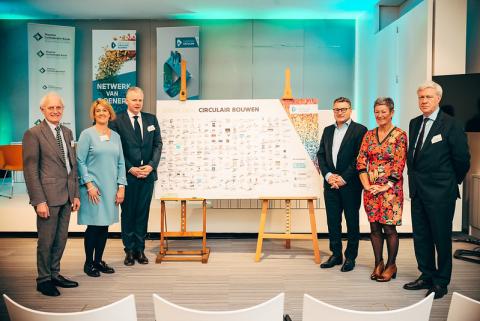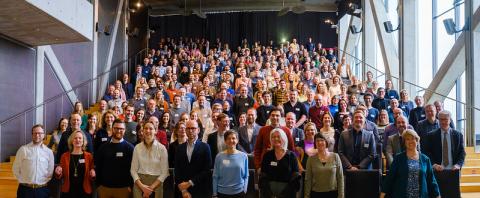
Green deal on Circular Construction

About this good practice
Flanders' ambition is to reduce material use by 30% by 2030 and to make the transition to a circular economy by 2050. The construction sector with its huge material consumption and environmental impact, is in the core of this challenge.
Circular construction aims to optimize resource utilization, generate economic, social, and environmental value, and consider both existing heritage and future opportunities in the construction industry.
To activate the value network for this transition, Circular Flanders, the Public Wast Agency Flanders (OVAM) and the Flemish Confederation for the Construction (Embuild) launched the GDCC.
About 370 organizations in Flanders committed to this innovative learning network by setting up experiments, testing circular principles in practice and uncovering bottlenecks. They shared experiences and insights with construction companies, building material producers, local and regional authorities, private landlord/owners, civil society organizations, knowledge-based institutions, researchers,...
The GDCC was growing thanks to the input and exchange in the learning network, through live meetings, webinars and an online learning and networking platform, action days, sight visits, … on all aspect of circular construction e.g. circular procurement, demolition inventory, change-oriented (re-)construction,... Participants act as ambassadors, carrying out the principles, experience gained and knowledge acquired and attracting more people to commit.
Expert opinion
Resources needed
Staff: 1,5 FTE (a senior A) during 4 years (2019-2023) ; 0,20 FTE for the year before and the follow up ; 15% overhead
Expertise: online learning platform, business consultancy for process guidance and consultancy communication
Estimation total cost +/- 1,020 000 EUR
Evidence of success
In a period of 4 years, 376 organisations committed to the green deal, with 651 employees actively involved. They conducted at least one pilot project during the Green Deal; participated in the learning network, made results available for research and structurally embedded the principles of Circular Construction. Together they raised awareness about the benefits of circular practices. Their advocacy efforts engaged more stakeholders enhancing to impact and accelerating the transition.
Potential for learning or transfer
The Green Deal Circular Construction transferability stems from its adaptable principles, working method an approach, shared challenges, and the urgent need for circular construction practices to reach climate goals overall in Europe. The approach has proven its success in Flanders and can be implemented in other regions or cities.
The process, method and results (good practices, pilots and lessons learned) of the GDCC are very well documented on the website of Circular Flanders and in a final report, available in Dutch and English.
The green deal is still alive trough the ”working agenda circular construction”, bottlenecks are addressed. Participants still are meeting and sharing progress in community events.
Further information
compilation images and quotes participants of the four years green deal
Images
Documents
2022_Final Report GDCC.pdf
20231128_KARMA WG Governance GDCC_EW.pdf
Website
Good practice owner
You can contact the good practice owner below for more detailed information.



